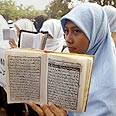
Archive photo
Photo: Reuters
Leaders of the Organization of the Islamic Conference (OIC) are meeting in Dakar for a two-day summit on Thursday during which they plan to discuss expressions of anti-Muslim sentiments in the West.
The organization also wants to alter its charter to make it more influential.
The OIC comprises 57 countries over four continents, the second largest inter-governmental organization after the United Nations. It was established in 1969 and aims to be the "collective voice of the Muslim world."
Members hope to agree on a modernized charter that will give it a more active and influential role.
Issues to be discussed at the summit, entitled Islam in the 21st Century, include dealing with Islamophobia, as well as the situation in the Palestinian territories, Lebanon, Iraq, Somalia and Sudan's Darfur.
Members are also seeking to increase intra-OIC trade among member states from 13 percent to 20 percent by the year 2015.
'Spillover of refugees'
The OIC membership is very diverse in terms of economic statuses and includes oil-rich countries such as Saudi Arabia and Gulf states, and impoverished African countries on the other side of the scale.
Another issue that host country Senegal hopes to see resolved by the end of the summit is a reconciliation pact between Sudan and Chad.
Leaders of the two countries were scheduled to meet on Wednesday ahead of the summit, but the meeting was put off because Sudanese President 'Umar Al-Bashir said he was tired and suffering from a headache.
Earlier, Al-Bashir had said although his country wanted peace with its neighbor Chad, he doubted the effectiveness of any reconciliation agreement, as all previous pacts to end the conflict had failed.
Relations between Sudan and Chad soured after the conflict in Sudan's Darfur province caused a spillover of refugees and fighters into the neighboring Chad.
N'Djamena, the Chadian capital, accuses Khartoum of backing Chadian rebels who are trying to overthrow the president.
Sudan, on the other hand, accuses Chad of supporting Sudanese rebel movements in Darfur.
In addition to Al-Bashir the participants of Wednesday's postponed meeting would have included UN Secretary-General Ban Ki-moon, Senegalese President 'Abdoulaye Wade, Chadian President Idriss Deby and Gabonese President 'Umar Bongo.
Reprinted by permission of The Media Line















